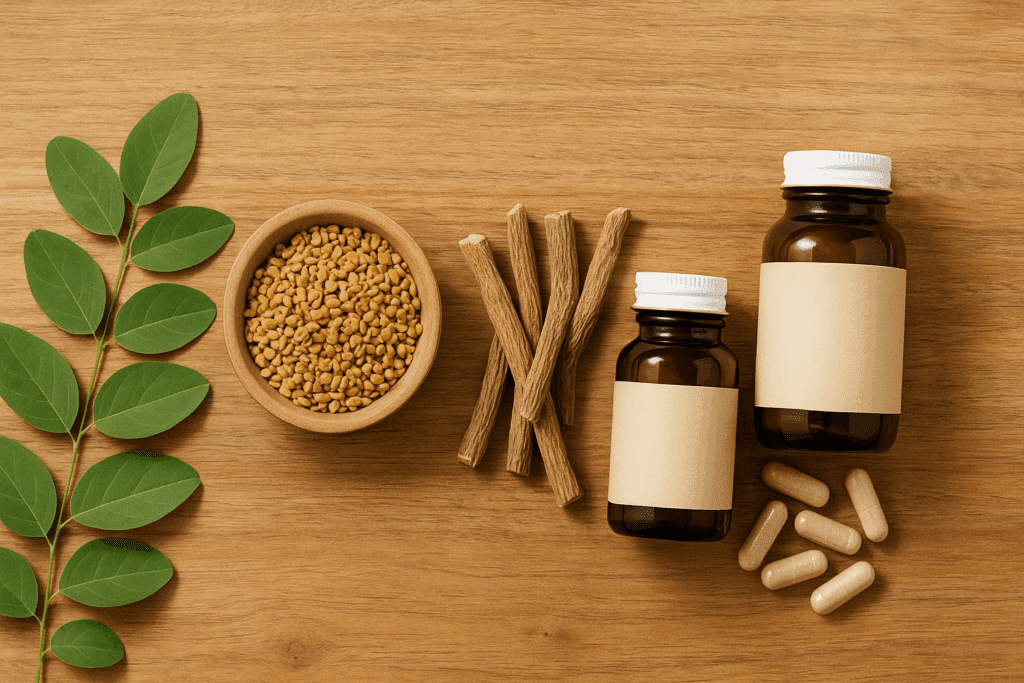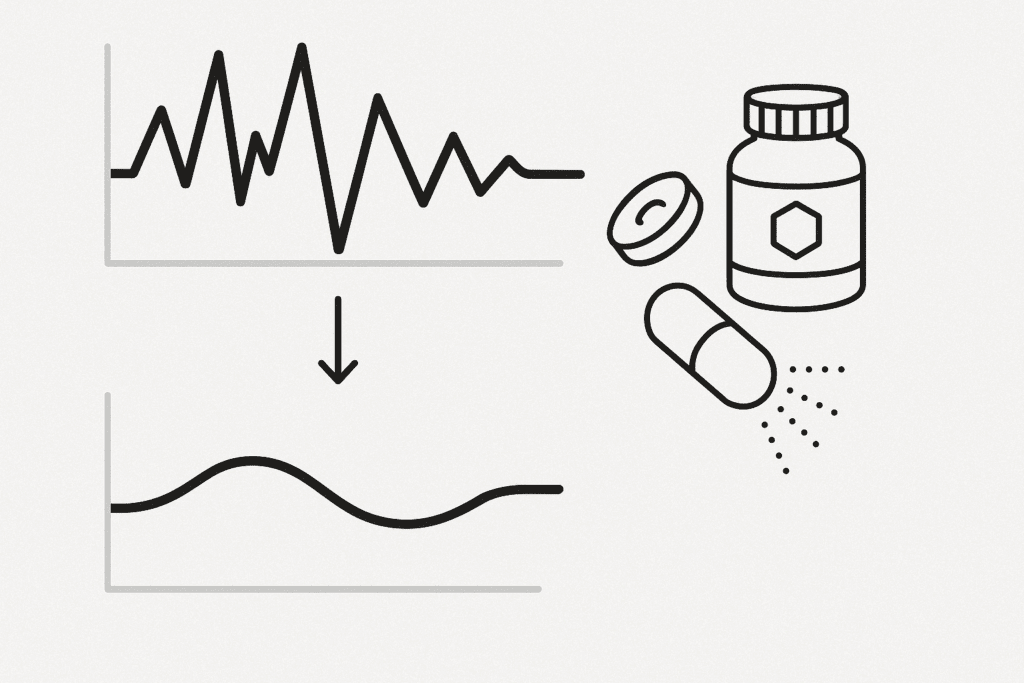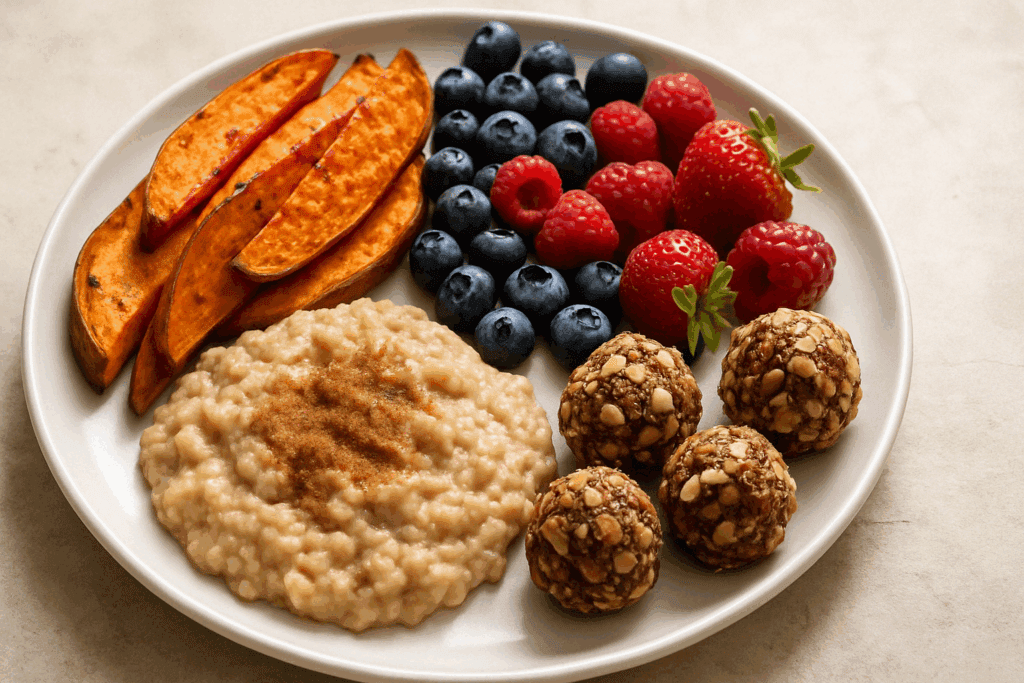Sugar cravings are one of the most stubborn barriers to achieving and maintaining a healthy diet. While many people chalk them up to weak willpower or emotional eating, science tells a far more intricate story. Cravings for sweet foods are often the result of complex interactions between brain chemistry, blood sugar fluctuations, hormonal imbalances, and even nutritional deficiencies. Fortunately, there are smarter, evidence-backed ways to address these cravings that go beyond simply saying no to dessert. With the right strategy, including the use of targeted supplements to help with sugar cravings, it’s possible to support your body’s natural balance and enjoy a more sustainable relationship with food.
In recent years, researchers and nutritionists have explored a variety of natural compounds that act as a natural sugar craving suppressant, helping to reduce the intensity and frequency of sweet cravings without relying on willpower alone. These include vitamins, herbal extracts, minerals, and plant-based nutrients that support neurotransmitter function, regulate appetite, and promote metabolic stability. When chosen thoughtfully and paired with a nutrient-dense diet, these supplements can provide meaningful support for anyone looking to regain control over their sugar intake. Let’s take a deeper look into the science behind cravings, what makes certain supplements effective, and how you can integrate these tools into your daily life for better health.
You may also like: Why Am I Craving Sweets All of a Sudden? Expert-Backed Reasons and How to Stop Sugar Cravings Naturally

Why Sugar Cravings Happen: The Physiology Behind the Urge
To understand how to stop sugar cravings, it’s essential to first understand where they come from. Sugar consumption stimulates the release of dopamine in the brain, producing feelings of pleasure and reward. This makes sugar highly reinforcing, especially during periods of stress or low mood. In addition, when blood sugar drops—often following a high-carb meal or snack—the body instinctively seeks out quick energy in the form of more sugar, creating a feedback loop that can be difficult to interrupt.
Cravings are also influenced by hormones like insulin, cortisol, and ghrelin, all of which play a role in hunger signaling and energy regulation. When these hormones are out of balance, the urge for sugar often intensifies. Many individuals find that even after eating a full meal, they still crave something sweet—an issue that often signals an imbalance in either blood sugar or brain chemistry. That’s why supplements to control sugar cravings are gaining popularity: they work by restoring internal harmony rather than simply masking the symptoms of craving.
For example, when chromium is used as a sugar craving suppressant, it helps improve insulin sensitivity and blood glucose regulation, which may reduce the intensity of cravings throughout the day. Similarly, magnesium helps with energy production and glucose metabolism, both of which are key to keeping cravings in check. When we understand these internal drivers, it becomes easier to choose the right supplements to suppress sugar cravings and support a more balanced eating pattern.

Top Nutrient Deficiencies Linked to Cravings—and How to Fix Them
Nutritional gaps are a hidden contributor to sugar cravings. One of the most common deficiencies associated with increased sugar intake is magnesium. Magnesium supports over 300 biochemical reactions in the body, including those involved in regulating insulin and blood sugar levels. When magnesium is low, the body may crave sugar as a way to compensate for energy instability. By addressing this deficiency with the right form and dosage, you may find that your cravings start to naturally diminish.
B-vitamins are another critical group of nutrients that impact energy metabolism and mood. A deficiency in B6, B12, or folate can lead to fatigue, irritability, and low mood—states that commonly prompt people to reach for sugary snacks. Including vitamins to stop sugar cravings as part of a daily wellness routine can not only boost energy levels but also support the production of serotonin and dopamine, two neurotransmitters closely linked to cravings and emotional eating.
Zinc and vitamin D also play important roles. Zinc supports appetite regulation and taste perception, while vitamin D influences mood and insulin sensitivity. Many people don’t realize that a lack of these nutrients may be contributing to the relentless pull of sugar. This is why multi-nutrient formulations are often recommended as the best supplements for sugar cravings, addressing root causes rather than offering short-term fixes.

Sweet Blockers and Herbal Allies for Craving Reduction
One of the more fascinating developments in the world of nutrition is the use of sweet blockers—natural compounds that interfere with the brain’s perception of sweetness. Gymnema sylvestre is the most well-known among these and has a long history of use in Ayurvedic medicine. When placed on the tongue, gymnema can temporarily block sweet taste receptors, making sugary foods taste bland or even unpleasant. This has a powerful psychological effect, reducing the reward response and weakening the urge to consume sweets.
Used as a supplement to stop sweet cravings, gymnema offers both short-term relief and long-term support for sugar reduction. Over time, it may also support blood sugar regulation by encouraging healthier insulin function. Other herbal allies include fenugreek, known for its ability to control appetite and glucose absorption, and licorice root, which supports adrenal function—particularly useful during periods of high stress that often trigger sugar binges.
Many supplements to reduce sugar cravings combine these herbs with vitamins and minerals for a multi-pronged approach. These natural blends not only help suppress cravings but also support overall metabolic health. For individuals seeking a supplement to curb sugar cravings, these plant-based options provide a gentle yet effective solution.

Addressing Emotional Eating: Mood-Supporting Supplements That Help
Cravings often stem from emotional states rather than true hunger. For example, stress, anxiety, and depression can drive the urge to consume sweets due to the temporary mood lift they provide. In these cases, addressing the emotional root is key to managing cravings. Certain supplements help by supporting neurotransmitter balance and promoting a calmer, more focused mental state.
L-theanine, an amino acid found in green tea, is well-known for its calming properties. It promotes alpha brain wave activity, encouraging relaxation without drowsiness. This makes it a great addition to supplements to stop cravings, especially for individuals who experience sugar binges in response to stress. Similarly, 5-HTP supports serotonin production, which may improve mood and reduce emotional eating behaviors.
Adaptogens like ashwagandha and rhodiola are also commonly included in the best sugar craving suppressant formulas. These herbs help modulate the body’s stress response, making it easier to resist impulsive behaviors. When stress is high, and self-regulation is low, even the most disciplined eater can succumb to temptation. By incorporating mood-supporting nutrients into your daily regimen, you provide yourself with both physiological and psychological resilience.

How Blood Sugar-Stabilizing Supplements Reduce Cravings Over Time
The connection between blood sugar control and cravings cannot be overstated. Fluctuating glucose levels cause energy crashes that the body tries to offset with a quick sugar fix. Supplements that help stabilize blood sugar throughout the day play a crucial role in preventing these cycles from taking hold. Chromium, alpha-lipoic acid, and berberine are among the most effective nutrients in this category.
Chromium supports insulin sensitivity and helps transport glucose into cells more efficiently, making it a cornerstone of many supplements to cut sugar cravings. Alpha-lipoic acid, an antioxidant, improves cellular energy use and has shown promise in reducing sugar-related urges. Berberine, derived from various plants, supports gut health and glucose regulation and is often considered one of the best supplements to stop sugar cravings for individuals with metabolic concerns.
When taken consistently, these supplements help flatten blood sugar peaks and valleys, which directly influences hunger and satiety. Over time, many people find that their desire for sugar lessens naturally as their body becomes better at maintaining stable energy levels. This is not about suppression in the traditional sense—it’s about restoration. The body is rebalanced, and the cravings fade as a result.
Choosing the Right Product: What to Look for in Supplements for Sugar Cravings
With so many options on the market, it can be difficult to determine which products to stop sugar cravings are actually effective. The most important consideration is ingredient quality. Look for supplements that use bioavailable forms of nutrients, meaning they are easily absorbed and utilized by the body. For instance, magnesium glycinate is often better tolerated than magnesium oxide, and methylated B-vitamins are preferred for those with MTHFR gene variants.
Transparency is key. Trustworthy brands will disclose full ingredient lists, include clinical dosages, and undergo third-party testing for purity and potency. Avoid proprietary blends that obscure how much of each ingredient is included. A truly effective supplement to stop sugar cravings should be backed by research, ideally with clinical trials or at least a solid foundation in nutritional science.
Combination formulas that address multiple triggers—blood sugar imbalances, nutrient deficiencies, mood instability—tend to be the most effective. When shopping, look for products that label themselves as supplements to block sugar cravings or pills to stop craving sugar, but always verify their claims with supporting evidence and clear labeling.

Integrating Healthy Foods That Curb Sweet Cravings Naturally
In addition to supplements, your diet plays a powerful role in curbing sugar cravings. Incorporating more healthy foods for sweet cravings into your meals can reduce the need for sugary snacks by satisfying the body’s need for sweetness in a nutritious form. Foods like berries, sweet potatoes, cinnamon-spiced oatmeal, and dates with nut butter offer sweetness alongside fiber, vitamins, and antioxidants.
These foods help stabilize blood sugar and train your palate to prefer natural flavors over artificial ones. For instance, roasted root vegetables can provide a naturally sweet flavor profile without the blood sugar rollercoaster. When these foods are paired with supplements to help with sugar cravings, the result is a comprehensive strategy that works both internally and externally to reduce dependency on added sugars.
This approach not only curbs cravings but also enhances overall well-being by providing the body with the nutrients it truly needs. The more your meals include naturally sweet, fiber-rich options, the less you’ll find yourself reaching for processed treats. Supplements are tools, not crutches—and when combined with mindful food choices, they create a sustainable path to a healthier lifestyle.
Here is a standalone, expert-level FAQ section designed to complement your main article on sugar cravings. Each answer offers fresh perspectives, deeper insights, and practical applications not covered in the primary content, while also ensuring seamless integration of all keyword phrases as required.
Frequently Asked Questions: Supplements and Strategies to Stop Sugar Cravings Naturally
1. Can a supplement really help reduce sugar cravings, or is it just a placebo effect?
While individual responses can vary, growing research supports the efficacy of certain supplements to stop sugar cravings that target biochemical pathways linked to hunger, mood, and blood glucose stability. These include chromium, gymnema sylvestre, and B-vitamin complexes, all of which influence how the body metabolizes glucose and regulates appetite. In contrast to the placebo effect, these compounds have demonstrated measurable benefits in clinical trials, such as reduced sweet intake and improved insulin sensitivity. When chosen thoughtfully and used consistently, the right sugar craving suppressant can offer tangible relief from cravings. While mindset and behavior still matter, a high-quality supplement to curb sugar cravings works on the root causes—not just perception.
2. Are sweet blockers safe for regular use, and how do they actually work?
A sweet blocker like gymnema sylvestre is generally considered safe when used as directed, though it should be avoided by individuals with certain health conditions or who are on blood sugar-lowering medications without medical supervision. These blockers temporarily bind to sweet taste receptors on the tongue, dulling the sensation of sweetness and thereby disrupting the dopamine-driven reward loop in the brain. Over time, this sensory recalibration can help reduce the emotional and behavioral pull of sugar-rich foods. Interestingly, regular use may also reduce sugar intake by reconditioning the palate to prefer less intensely sweet flavors. As a result, these products to stop sugar cravings can support long-term dietary changes without relying on deprivation.
3. How do stress and emotional eating tie into the effectiveness of sugar craving supplements?
Stress-induced cravings are typically driven by cortisol spikes and shifts in serotonin, making people more prone to emotional eating. Many supplements to suppress sugar cravings now include adaptogens like ashwagandha and mood-regulating nutrients such as 5-HTP to counteract these triggers. These ingredients help manage the physiological impact of stress and support more balanced neurotransmitter function, which in turn reduces the emotional compulsion to seek out sugar. In this way, a natural sugar craving suppressant doesn’t just address hunger but also targets the psychological reasons we eat when we’re not physically hungry. Over time, this dual-action approach may help recalibrate your reward systems and create healthier coping mechanisms.
4. Are there any specific times of day when supplements to reduce sugar cravings are most effective?
Yes, timing can significantly influence the effectiveness of supplements to reduce sugar cravings. Many users find that mid-morning or mid-afternoon is the optimal window, particularly because cravings often spike when energy dips or meals are delayed. Taking a supplement to stop sweet cravings during these windows can act as a preventative measure, helping to stabilize mood and blood sugar before cravings intensify. For nighttime snackers, an evening dose may be beneficial, especially if the product includes calming or serotonin-supporting ingredients. Matching the supplement timing with your individual craving patterns is one of the best ways to ensure lasting effectiveness and support a healthier eating rhythm.
5. What role do micronutrients play in regulating cravings beyond the typical B vitamins and chromium?
While B vitamins and chromium are well known for their role in sugar regulation, other micronutrients such as zinc, vanadium, and magnesium also play a part. Zinc supports healthy appetite signals and taste perception, which can alter the intensity of sweet cravings. Magnesium is involved in glucose metabolism and often depleted during periods of stress or poor sleep—two major triggers for cravings. Some advanced supplements for sugar cravings now include vanadium, a lesser-known trace mineral that may mimic insulin’s effects and help stabilize blood sugar. These lesser-discussed nutrients, when properly formulated, add a unique edge to the best supplements for sugar cravings by supporting multiple metabolic systems simultaneously.
6. Can sugar craving supplements support weight loss efforts?
While supplements to help with sugar cravings are not weight loss pills per se, they often indirectly support weight loss by reducing the consumption of added sugars and unnecessary snacking. Many people report that once their cravings diminish, it becomes significantly easier to maintain a calorie deficit without feeling deprived. In this way, a supplement to curb sugar cravings can be a strategic ally in a weight management plan by improving dietary adherence. When paired with regular meals, fiber-rich foods, and physical activity, these supplements to stop cravings enhance the overall success of a sustainable lifestyle change. For best results, they should be integrated into a comprehensive health plan rather than used in isolation.
7. What are some emerging trends in supplement development for sugar craving control?
The supplement industry is evolving rapidly, and new formulations are beginning to focus on gut-brain axis modulation as a tool to manage cravings. Innovations include prebiotic and probiotic blends that support microbial diversity, which in turn can influence mood and appetite signals. Some supplements to cut sugar cravings now include ingredients like inositol, which supports insulin sensitivity and serotonin activity. Other products are incorporating novel delivery systems—such as lozenges or oral strips—that act as immediate sweet blockers when cravings strike. These newer products to stop sugar cravings offer on-demand support while also contributing to long-term habit transformation through biological modulation.
8. Can I use pills to stop craving sugar alongside prescription medications or other supplements?
Caution is always advisable when combining pills for sugar cravings with prescription medications, particularly those that affect blood sugar, blood pressure, or mood. Some supplements to control sugar cravings can potentiate or interfere with medications for diabetes, anxiety, or depression. Always consult your healthcare provider before starting any new supplement regimen to avoid potential interactions. That said, many people find that with proper guidance, combining pharmaceutical and nutritional interventions can lead to improved outcomes. It’s also wise to check for overlapping ingredients if you’re already taking other wellness products to ensure you’re not inadvertently exceeding safe levels of key nutrients.
9. How long does it typically take to notice results from sugar craving supplements?
The time it takes to experience benefits varies depending on the individual and the type of sugar craving suppressant used. Fast-acting ingredients like gymnema can dull sweetness within minutes, making them useful for immediate intervention. However, broader metabolic changes from minerals like chromium or vitamins to stop sugar cravings usually require consistent use over several weeks. Emotional and behavioral improvements may also take time as the body adjusts to more stable blood sugar and neurotransmitter levels. Most users begin noticing changes in their cravings and energy patterns within two to four weeks, especially when the best supplement to stop sugar cravings is paired with balanced meals and good sleep hygiene.
10. What are some food-based strategies that work well with supplements for sugar cravings?
While supplements provide internal support, healthy foods for sweet cravings help reinforce habit change and retrain the taste buds. Roasted vegetables like carrots or beets offer natural sweetness alongside fiber and antioxidants. Pairing fruit with healthy fat—such as berries with coconut yogurt or apple slices with peanut butter—can reduce blood sugar spikes while satisfying sweet urges. These foods, when combined with supplements to block sugar cravings, help reduce the emotional dependency on processed sugar. Over time, your brain starts to associate sweetness with nourishment instead of indulgence, making the effect of even the best sugar craving suppressant more durable and meaningful.
Conclusion: Embrace Smarter Strategies and the Best Supplements for Sugar Cravings
Overcoming sugar cravings is not about deprivation or rigid discipline—it’s about understanding your body’s signals and responding to them with intelligence and care. Today’s growing selection of supplements to help with sugar cravings gives individuals a much-needed bridge between knowledge and action. Whether you’re targeting nutrient deficiencies, blood sugar swings, or emotional triggers, the right supplement can serve as a powerful ally in your journey toward mindful eating.
From natural sugar craving suppressant ingredients like gymnema sylvestre and chromium to vitamins that stop sugar cravings by restoring biochemical balance, there are numerous tools available to support your efforts. The key is to choose high-quality, well-formulated options that align with your individual needs and complement a whole-food, nutrient-dense diet. Products marketed as pills to stop craving sugar or supplements to reduce sugar cravings should never replace food—but when used thoughtfully, they can enhance your results and accelerate your progress.
Ultimately, the best supplement to curb sugar cravings is the one that empowers you to make healthier choices consistently and without feeling restricted. By addressing cravings at their root and embracing a holistic, science-backed strategy, you can regain control over your eating habits, reduce reliance on sugar, and create a lifestyle that supports long-term health and vitality.
Was this article helpful? Don’t let it stop with you. Share it right now with someone who needs to see it—whether it’s a friend, a colleague, or your whole network. And if staying ahead on this topic matters to you, subscribe to this publication for the most up-to-date information. You’ll get the latest insights delivered straight to you—no searching, no missing out.
Further Reading:
19 Foods That Can Fight Sugar Cravings
Top 10 Supplements to Block Sugar Cravings
20 Foods That Can Help Fight Sugar Cravings
Disclaimer
The information contained in this article is provided for general informational purposes only and is not intended to serve as medical, legal, or professional advice. While NewsHealthWatch strives to present accurate, up-to-date, and reliable content, no warranty or guarantee, expressed or implied, is made regarding the completeness, accuracy, or adequacy of the information provided. Readers are strongly advised to seek the guidance of a qualified healthcare provider or other relevant professionals before acting on any information contained in this article. NewsHealthWatch, its authors, editors, and contributors expressly disclaim any liability for any damages, losses, or consequences arising directly or indirectly from the use, interpretation, or reliance on any information presented herein. The views and opinions expressed in this article are those of the author(s) and do not necessarily reflect the official policies or positions of NewsHealthWatch.

